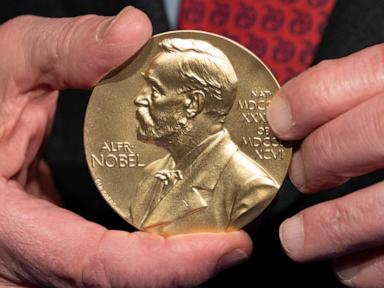STOCKHOLM — South Korean author Han Kang was awarded the Nobel Prize in literature Thursday for a poetic and unsettling body of work that the Nobel committee said “confronts historical traumas and exposes the fragility of human life.”
A slow-burning literary success who was won multiple awards in Korea and Europe, Han is the first Asian woman and the first South Korean writer to win the Nobel literature prize.
Nobel committee chairman Anders Olsson praised Han’s “physical empathy for the vulnerable, often female lives” of her characters, in novels such as “The Vegetarian” and “Human Acts.”
“She has a unique awareness of the connections between body and soul, the living and the dead,” Olsson said.
Nobel literature committee member Anna-Karin Palm said Han writes “intense lyrical prose that is both tender and brutal, and sometimes slightly surrealistic as well.”
Han is the second South Korean national to win a Nobel Prize. Late former President Kim Dae-jung won the peace prize in 2000 for his efforts to restore democracy in South Korea during the country’s previous military rule and improve relations with war-divided rival North Korea.
Han wins the Nobel at a time of growing global influence of South Korean culture, which in recent years has included the success of films like director Bong Joon-ho’s Oscar-winning “ Parasite,” the Netflix survival drama “Squid Game” and the worldwide fame of K-pop groups like BTS and BLACKPINK.
Han, 53, won the International Booker Prize in 2016 for “The Vegetarian,” an unsettling novel in which a woman’s decision to stop eating meat has devastating consequences.
At the time of winning that award, Han said writing novels “is a way of questioning for me.”
“I just try to complete my questions through the process of my writing and I try to stay in the questions, sometimes painful, sometimes – well – sometimes demanding,” she said.
With “The Vegetarian,” she said, ”I wanted to question about being human and I wanted to describe a woman who desperately didn’t want to belong to the human race any longer.”
Han made her publishing debut as a poet in 1993; her first short story collection was published the following year and her first novel, “Black Deer,” in 1998. Works translated into English include “The Vegetarian,” “Greek Lessons,” “Human Acts” and “The White Book,” a poetic novel that draws on the death of Han’s older sister shortly after birth. “The White Book” was an International Booker Prize finalist in 2018.
Her most recent novel, “We Do Not Part,” is due to be published in English next year.
Olsson, the Nobel committee chair, called “Human Acts” a work of “witness literature.” It is based on the real-life killing of pro-democracy protesters in Han’s home city of Gwangju in 1980. The book won Italy’s Malaparte Prize in 2017.
The literature prize has long faced criticism that it is too focused on European and North American writers of style-heavy, story-light prose. It has also been male-dominated, with just 17 women among its 119 laureates until this year’s award. The last woman to win was Annie Ernaux of France, in 2022.
Six days of Nobel announcements opened Monday with Americans Victor Ambros and Gary Ruvkun winning the medicine prize. Two founding fathers of machine learning — John Hopfield and Geoffrey Hinton — won the physics prize. On Wednesday, three scientists who discovered powerful techniques to decode and even design novel proteins were awarded the Nobel Prize in chemistry.
The Nobel Peace Prize will be announced Friday and the economics award on Monday.
The prize carries a cash award of 11 million Swedish kronor ($1 million) from a bequest left by the award’s creator, Swedish inventor Alfred Nobel. The laureates are invited to receive their awards at ceremonies on Dec. 10, the anniversary of Nobel’s death.
An earlier version of this story incorrectly said “Human Acts” was an International Booker Prize finalist in 2018. “The White Book” was a finalist for the prize.
Lawless reported from London. Corder reported from The Hague, Netherlands. Kim Tong-hyung in Seoul, South Korea, contributed.



![Rifaat Jouda walks with his son as he enters Gaza City following a long journey from southern Gaza,on January 28, 2025 [Abdelhakim Abu Riash/Al Jazeera]](https://esbecgroup.com/wp-content/uploads/2025/01/Exhausted-Palestinians-arrive-in-Gaza-City-to-no-homes-killed-family.jpg)






